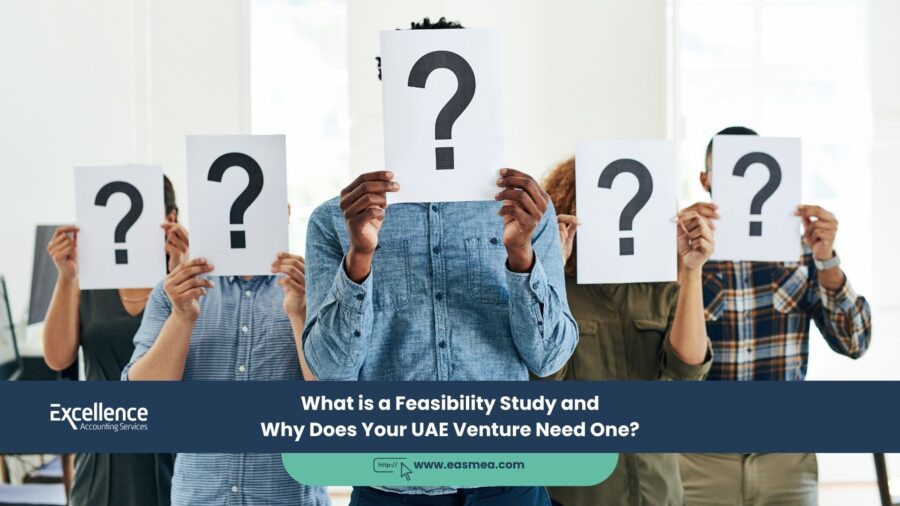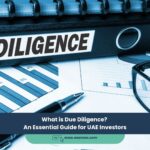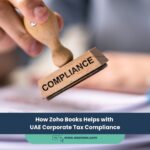What is a Feasibility Study and Why Does Your UAE Venture Need One?
Every great business starts with a powerful idea. In the ambitious and forward-thinking landscape of the UAE, entrepreneurs are constantly conceiving innovative ventures, from cutting-edge tech platforms to unique hospitality concepts. The passion and vision behind these ideas are the fuel for progress. However, passion alone does not guarantee success. The path from a brilliant concept to a profitable, sustainable business is fraught with challenges, uncertainties, and risks.
- What is a Feasibility Study and Why Does Your UAE Venture Need One?
- Feasibility Study vs. Business Plan: Understanding the Critical Difference
- Why a Feasibility Study is Non-Negotiable for UAE Ventures
- The Pillars of a Comprehensive Feasibility Study: The TELOS Framework
- The Feasibility Study Process: A Step-by-Step Guide
- How Excellence Accounting Services (EAS) Delivers Actionable Feasibility Studies
- Frequently Asked Questions (FAQs)
- Is Your Big Idea Viable?
How do you determine if your promising idea has the legs to stand on its own in a competitive market? How do you convince investors, bankers, and even yourself that this venture is worth the significant investment of time, money, and resources? The answer lies in a critical, often overlooked, preliminary step: the Feasibility Study. It is the disciplined process of asking and answering the tough questions *before* you commit, transforming a hopeful vision into a well-vetted, strategic project.
This guide will demystify the feasibility study, explaining exactly what it is, what it entails, and why it is an indispensable tool for anyone looking to launch or expand a business in the UAE. We will explore the key components of a robust study and provide a clear roadmap for conducting one, ensuring your next big idea is built on a foundation of data and diligence, not just dreams.
Key Takeaways
- A Feasibility Study Tests Viability: It is an objective analysis of a business idea to determine if it is practical, possible, and profitable *before* significant resources are invested.
- It’s Not a Business Plan: A feasibility study answers “Should we do this project?” while a business plan answers “How will we do this project?”. The study comes first.
- Crucial for the UAE Market: High setup costs, a dynamic market, and complex regulations make it essential to validate your concept before launching in the UAE.
- Comprehensive Analysis is Key: A proper study assesses multiple facets, including Technical, Economic, Legal, Operational, and Scheduling (TELOS) feasibility.
- Informs the Go/No-Go Decision: The ultimate output is a clear recommendation on whether to proceed with the venture, pivot the idea, or abandon it, saving potentially millions in the long run.
Feasibility Study vs. Business Plan: Understanding the Critical Difference
Many entrepreneurs mistakenly use the terms “feasibility study” and “business plan” interchangeably. While related, they serve distinct and sequential purposes. Understanding this difference is fundamental.
- A Feasibility Study is an investigative tool. Its purpose is to explore the viability of an idea. It is internally focused, designed to provide decision-makers with the information needed to approve, reject, or modify a proposal. The core question it answers is: “Is this a viable business idea?”
- A Business Plan is a strategic roadmap. It is created *after* a project has been deemed feasible. It outlines the specific steps the company will take to execute the idea, detailing marketing, sales, operational, and financial strategies. The core question it answers is: “How are we going to make this viable idea a success?”
Attempting to write a business plan without first conducting a feasibility study is like drawing a map without knowing if the destination is reachable. You might have a beautiful plan, but it could lead you straight off a cliff.
Why a Feasibility Study is Non-Negotiable for UAE Ventures
In the dynamic and often costly UAE market, “testing the waters” with a live business can be a recipe for financial disaster. A feasibility study acts as a crucial simulation, allowing you to assess the landscape before deploying capital.
- High Cost of Entry and Operation: From trade license fees and office rent to visa processing and staffing, the initial setup costs in the UAE can be substantial. A feasibility study ensures this capital is not wasted on a non-viable concept.
- Intense Market Competition: The UAE is a global hub that attracts businesses from around the world. A feasibility study provides a deep dive into the competitive landscape, helping you understand if there is a genuine, serviceable gap in the market for your offering.
- Complex Regulatory Environment: Each business activity is governed by specific rules from economic departments, free zone authorities, and federal bodies like the FTA. A study assesses the legal and regulatory hurdles, ensuring your business model is compliant from the start.
- Securing Investment and Loans: Sophisticated investors and banks in the UAE will not fund an idea based on enthusiasm alone. A professional feasibility study is often a prerequisite for securing financing, as it demonstrates that you have done your homework and that the project is based on sound analysis.
The Pillars of a Comprehensive Feasibility Study: The TELOS Framework
A thorough feasibility study is a multi-faceted analysis. The TELOS acronym provides a useful framework for understanding the five key areas of investigation.
1. Technical Feasibility
This pillar assesses whether you have the technical resources and capabilities to bring the project to life. It’s not just for tech companies; it applies to any business.
- Do we have the necessary equipment, technology, and materials?
- Do we have the skilled personnel required, or can we acquire them?
- Where will the business be located, and is the physical site suitable?
2. Economic Feasibility (Financial Feasibility)
This is the heart of the study. It involves a detailed cost-benefit analysis to determine if the venture is financially viable and offers an attractive return on investment (ROI).
- Startup Cost Analysis: A detailed breakdown of all initial one-time costs (licenses, fit-out, equipment, etc.).
- Operating Cost Projections: Forecasting ongoing monthly costs (salaries, rent, utilities, marketing).
- Revenue Projections: Estimating potential sales and pricing strategies based on market research.
- Financial Metrics: Calculating key indicators like the break-even point, payback period, net present value (NPV), and internal rate of return (IRR).
This section often requires expert financial modeling to ensure accuracy.
3. Legal Feasibility
This pillar examines whether the proposed venture conflicts with any legal or regulatory requirements in the UAE.
- Does the business comply with zoning laws, data protection laws, and environmental regulations?
- What licenses and permits are required from the DED, free zone authorities, or other government bodies?
- Are there any potential trademark or copyright issues?
- Does the business structure (e.g., LLC, FZE) align with ownership and liability requirements?
4. Operational Feasibility
This assesses how well the project fits within the organization’s existing operations and capabilities. It’s about the “how-to” of day-to-day execution.
- How will the new venture be managed?
- Does it align with the company’s strategic goals and core competencies?
- What are the supply chain and logistics requirements?
- How will we handle customer support and service delivery?
5. Scheduling Feasibility
This final pillar focuses on the project timeline. It determines whether the project can be completed within a reasonable and defined timeframe.
- What are the major project milestones?
- How long will each phase take (e.g., licensing, setup, launch)?
- Are there any dependencies that could cause delays?
- Is the proposed completion date realistic?
| Feasibility Type | Core Question | Example for a New Restaurant Venture in Dubai |
|---|---|---|
| Technical | Can we build it? | Do we have access to the right kitchen equipment and a chef with the required expertise? |
| Economic | Will it be profitable? | What is the break-even point in terms of daily customers? What is the expected ROI? |
| Legal | Are we allowed to do it? | Do we have the correct trade license and food permits from Dubai Municipality? |
| Operational | Can we run it effectively? | How will we manage inventory, staffing, and customer reservations on a daily basis? |
| Scheduling | Can we do it on time? | Can we complete the fit-out, hiring, and licensing within the 6-month target before peak season? |
The Feasibility Study Process: A Step-by-Step Guide
Conducting a feasibility study is a structured process that moves from broad analysis to a specific recommendation.
- Conduct a Preliminary Analysis: Start with a high-level review of the idea. Is there an obvious, insurmountable barrier? This initial screening helps weed out clearly non-viable ideas before investing in a full study.
- Outline the Scope: Clearly define the objectives and scope of the study. What specific questions are you trying to answer?
- Conduct Market Research: This is a critical input. Analyze the target industry, potential customers, and competitors. Gather data on market size, trends, and pricing.
- Assess Financial Projections: Work with financial experts to build out the economic feasibility model, including startup costs, operating costs, and revenue forecasts.
- Review Operational and Technical Requirements: Detail the resources, technology, and processes needed to run the business.
- Analyze Findings and Data: Consolidate all the information gathered from the different pillars of the study.
- Make the Go/No-Go Decision: Based on the comprehensive analysis, the final step is to make a recommendation. The outcome isn’t always a simple “yes” or “no.” It could be a “conditional yes,” suggesting modifications to the business model to make it viable.
How Excellence Accounting Services (EAS) Delivers Actionable Feasibility Studies
A feasibility study is only as valuable as the data and analysis it contains. At EAS, we provide rigorous, data-driven feasibility studies that give you the clarity and confidence to make sound investment decisions.
Our Feasibility Study Services Include:
- Comprehensive Market Analysis: We go beyond surface-level data to provide a deep understanding of the market landscape, competitive pressures, and customer demand.
- Robust Financial Modeling: Our financial experts build detailed models to project costs, revenues, and key performance indicators (KPIs), providing a clear picture of the venture’s economic potential.
- Regulatory and Compliance Review: We help you navigate the complexities of UAE business regulations to ensure your proposed venture is legally sound.
- Objective, Unbiased Reporting: We deliver a clear, comprehensive report with an unambiguous recommendation, empowering you to proceed with confidence or avoid a costly mistake. Our studies are trusted by investors, banks, and business leaders across the UAE.
Frequently Asked Questions (FAQs)
Market research is a *component* of a feasibility study, but it is not the whole thing. Market research focuses on the market, customers, and competitors (part of commercial feasibility). A full feasibility study is much broader, also including financial, technical, legal, and operational analysis to provide a holistic view of the project’s viability.
While an entrepreneur can and should do preliminary research, a formal feasibility study for a significant investment requires objectivity and specialized expertise, particularly in financial modeling and legal analysis. An internally-produced study can be biased by the creator’s passion for the idea. A third-party study from a firm like EAS provides an unbiased, professional assessment that is more credible to investors and lenders.
While all parts are interconnected, the Economic (Financial) Feasibility is often considered the most critical. A project can be technically possible, legal, and operationally sound, but if the numbers don’t work and it cannot generate a profit and a positive return on investment, it is not a viable business venture.
The timeline depends on the complexity of the project. A study for a small retail outlet might take 3-4 weeks. A study for a large manufacturing plant or a complex technology platform could take several months. The key is to allocate enough time for thorough research and analysis.
This is a positive outcome, not a failure! The study has done its job by saving you from investing significant time and money into a venture that was likely to fail. The findings might also reveal a way to pivot or modify your original idea to make it viable. It’s an opportunity to rethink and refine your strategy based on data.
The primary audience is the internal decision-makers: the entrepreneur, the CEO, or the board of directors. However, it is also a key document for external stakeholders. It is often required by banks when applying for a business loan and by venture capitalists or angel investors before they will consider funding a project.
No. A feasibility study is a predictive tool, not a guarantee. It confirms that, based on current data and reasonable assumptions, the project *has the potential* to be successful. The actual success will still depend on execution, management, marketing, and adapting to changing market conditions. However, it dramatically increases the probability of success by ensuring you start with a viable concept.
The cost varies widely based on the scope and depth of the study. It is a significant investment, but it should be weighed against the potential loss of investing in a non-viable business. The cost of a professional study is a small fraction of the total project cost and should be considered a critical form of insurance against business failure.
Absolutely. Feasibility studies are not just for new startups. They are essential for any major strategic initiative, such as launching a new product line, expanding into a new country (e.g., from the UAE to Saudi Arabia), or opening a new branch. The process is the same: to test the viability of the expansion before committing resources.
The single biggest mistake is not doing one at all. Many businesses are launched on passion and gut feeling alone. The second biggest mistake is treating it as a mere formality to be rushed through, rather than a genuine, objective investigation. A half-hearted study is almost as dangerous as no study at all.
Conclusion: Your First and Most Important Investment
In the ambitious economic climate of the UAE, a great idea is the starting point, not the finish line. A feasibility study is the bridge that connects that initial spark of inspiration to a tangible, profitable reality. It is a disciplined process of due diligence that stress-tests your concept against the realities of the market, the constraints of your resources, and the logic of financial returns.
By investing in a thorough feasibility study, you are making the most important investment of all: an investment in informed decision-making. It provides the clarity to proceed with confidence, the wisdom to pivot when necessary, and the foresight to walk away from a path that leads to failure.
Is Your Big Idea Viable?
Our expert analysis provides the clarity you need to make the right decision for your next business venture in the UAE.




